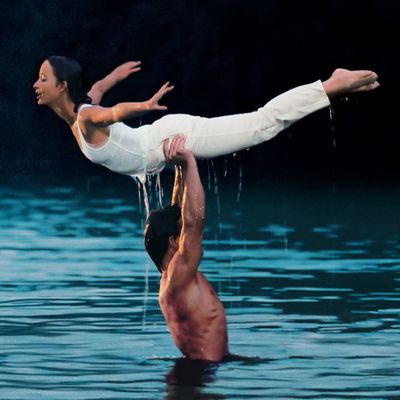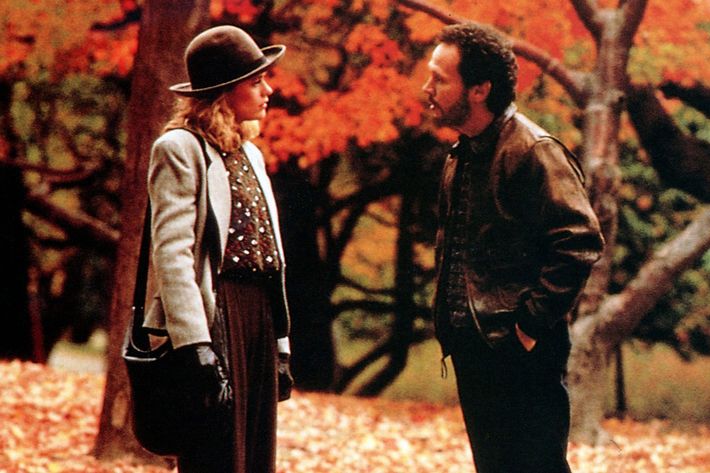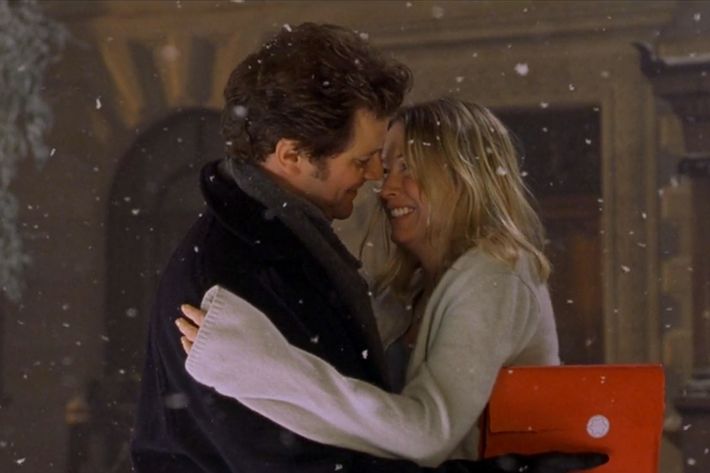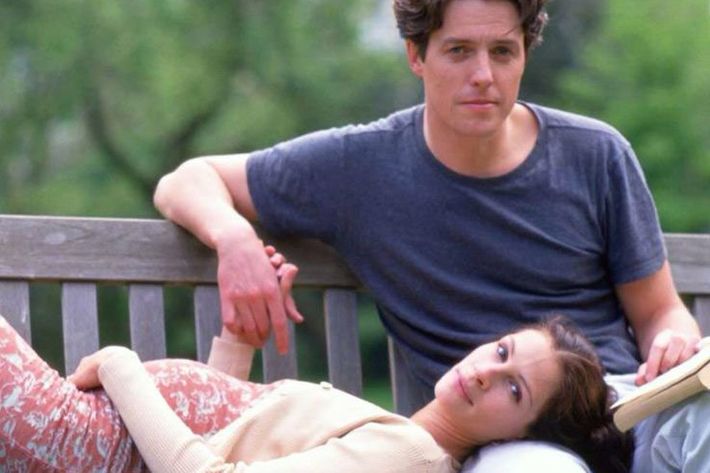
This week, four of our writers are participating in an extremely serious debate regarding which season is the best setting for a romantic comedy. Is it winter, when Nancy Meyers bundles all of her characters in adorable sweaters? Is it spring, when both the ice and Tom Hanks’s cold corporate heart start melting? Is it summer, when everyone is confused about whether to marry Julia Roberts or Cameron Diaz? Or is it fall, when Taylor Swift, who thinks she is in a rom-com, drinks maple lattes? Read on for Hunter Harris’s defense of summer.
The romantic comedies of June, July, and August reign supreme because they’re totally unpretentious. There’s no fussing over a winter holiday party, none of the production of a spring wedding or prom. Summer is a series of lazy weekends. Summer lovers can play fast and loose with their emotions, because summer love is a parenthesis, an addendum to your normal life. You can be a little naughtier, get a little friskier. Summer is the only season with its own code of conduct (when was the last time you consulted Google for a “song of the winter”?); summer flings come with a built-in expiration date for the romantically fickle.
And there’s just something sensual about summer. We’re trained to see the season as the year’s natural rupture: School’s out, summer Fridays start, and we’re all flocking to the nearest rooftop bar or wraparound porch to sip summer water. The simple act of being away — from the city, from friends and family, from the familiar — is key to the vacation romance, which is squarely within the summer rom-com’s province.
Consider Something’s Gotta Give: For a week in the summer, Erica Berry (Diane Keaton) shares her immaculate Hamptons house with Harry Sanborn (Jack Nicholson), the aging playboy her daughter is dating. Our quinquagenarian heroine’s reluctance is demonstrated by the ivory turtlenecks she wears in the summer. When she and Harry are finally ready to sleep together, Keaton interrupts their make-out session to shove scissors into Nicholson’s hand, begging him to cut her out of the top and then bring her to orgasm. The summer turtleneck — which is very much not a thing! — shows how key the season is to challenging these older lovers’ idea of what suits them.
Technically, only one of our lovers in Before Sunset is away on a vacation, but Celine (Julie Delpy) sees her city through fresh eyes when she runs into Jesse (Ethan Hawke) in a Paris bookshop. It’s nine years after their original meeting in Before Sunrise — which my colleague Jen Chaney (wrongly) claimed as a spring romantic comedy, which I will address shortly — and they pick up right where they left off, going on another prolonged, heady walk and talk. Is there another romance more endlessly rewatchable than Jesse and Celine’s? They walk around the city, talking in circles and half-thoughts, with bluster and moving ambivalence. Separately, in the time since Prague, they’ve fallen into almost identical dissatisfaction. Jesse is lonely in an passionless marriage: “I feel like I’m running a small nursery with somebody I used to date.” Celine is afraid to admit that she’s given up on romance entirely: “You know what? Reality and love are almost contradictory for me.” They talk in and around their feelings and fears like the rest of us, right there on screen.
But — and this is the really romantic part — by the end, Jesse shirks the convention every other summer romance has taught us: He stays on vacation, in that away-place. “Baby, you are going to miss that plane,” Celine says. Jesse smiles, choosing to build their summer romance — asking out the random girl on the random train — into a real life: “I know.”
By the time we see them again, nine years later in Before Midnight, their bliss is complicated, and putting one of Celine’s Before Sunset lines to the test: “Maybe we’re only good at brief encounters,” she says when they remeet in 2004, “walking around in European cities in warm climates.”
(It is here where I will pause briefly to argue that these movies are all summer rom-coms: In Before Sunrise, Celine and Jesse meet on June 16, 1994. Technically, the summer solstice didn’t occur until June 21 in 1994. However, in Before Sunset, Jesse and Celine reminisce about their long walk around Vienna, and refer to it as having taken place in the summer. “Can you believe it was nine years ago we were walking around Vienna? Feels like two months ago,” Jesse says in the coffee shop, “but it was summer of ’94.” If Celine and Jesse call it summer, that’s good enough for me.)
In Before Midnight, it’s 2013, and the last night of their family’s summer vacation in Greece. They’re parents and lovers and sparring partners now. Before Midnight happens both later in the day, and later in the season, than Before Sunset, and real life is looming. There’s something extra stressful about the end of summer, which adds another layer to their middle-aged bickering: Where is Celine’s career going? How can Jesse get closer to the son from his first marriage while living across the world? We’ve never known this couple in any season but summer, when they’re free to indulge in the luxuries of travel, confusion, and imprecision. The summer of 2013 finds them hot and literally bothered, stealing away on a long walk to get deeply and dually frustrated — and then meet again on a patio (a classic summer-rom-com spot) to make up.
The school calendar means that summer movies corner the market on coming-of-age, giving June, July, and August yet another edge over romances kindled in other months. Our adolescent lives are marked by big, important summers: the summer before college, the first summer we could drive, the summer after we graduated from undergrad, the one when we finished with school entirely. Summer isn’t always about escaping away somewhere; sometimes it’s about returning home, fidgeting inside our old lives — and finding somebody to fidget with, at least temporarily.
A pair of iconic romantic comedies speaks to the beautiful limbo of a summer romance: The Graduate (yes, The Graduate is a rom-com) and Say Anything. Two deeply bored, dissatisfied Pasadenans shack up in The Graduate, trying to pass an otherwise lackadaisical season. It’s a perfect movie about the awkwardness of entering into the contained chaos of life post-grad. Benjamin Braddock (Dustin Hoffman) falls into a routine with Mrs. Robinson (Anne Bancroft) because all he knows how to do is follow someone else’s instructions. The Graduate exploits his awkwardness to a hilarious result — he’s always tripping over himself, mumbling his words, coming on too weak or too strong, letting out that awkward little whelp. I’m not into Say Anything, personally, but something important happens the summer before you travel to college, all the growing pains of leaving home and growing into an adult life fester. It’s Lloyd and Diane (John Cusack and Ione Skye) against the harsh adolescent lights of adulthood. Who knows if either of these couples, who linked up on a whim, stay together?
Princess Diaries 2: Royal Engagement — before you roll your eyes, please respect that this movie was written by Shonda Rhimes — is a classic coming-of-age summer romance. Fresh out of Princeton, Mia Thermopolis (Anne Hathaway) eyes the crown nervously, but is quickly distracted by Chris Pine. Something similar happens to Amanda Bynes in What a Girl Wants: She’s working through issues with her dad while she starts hooking up with a local. Ditto Adventureland, where Jesse Eisenberg watches (and occasionally awkwardly impersonates) Ryan Reynolds’s laid-back-Lothario masculinity, crushing on fellow amusement-park worker Kristen Stewart. These romances aren’t the bedrocks of these coming-of-age movies, but they’re summer loves that communicate personal growth.
In Enough Said, Nicole Holofcener takes on a pivotal adolescent summer from the parents’ perspective. Eva (Julia Louis-Dreyfus) and Albert (James Gandolfini) are divorcees beginning a romance the summer before their daughters go off to college. They’re an odd match, and we can see it through their different parenting styles, and how they process their daughters’ departures differently. The movie’s main high jinks center on the fact that Eva is Albert’s ex-wife’s masseuse and quasi-friend, but Eva and Albert’s strongest connection as a couple is that they’re bracing themselves for the same loss. (Holofcener’s other summer romantic comedy, Walking and Talking, doesn’t have anything to do with school, but feels particularly mid-20s coming-of-age.)
Of course, and obviously, summer is also a deeply sexy season. We’re peeling off our clothes or pulling on denim cutoffs, skinny-dipping, staying out late, and lapping up mixed drinks. Summer is at its most sensual when Luca Guadagnino is filming it in Italy: Between 2017’s (decidedly rom-dram) Call Me by Your Name, 2015’s quasi-psychological thriller A Bigger Splash, and even scenes from his first movie, I Am Love, the casualness of bearing skin and walking around barefoot in the heat is seductive. Elio (Timothée Chalamet) and Oliver’s (Armie Hammer) romance is inextricable from the season that surrounds it. They intertwine so thoroughly — and so sweatily — that you can’t tell where one ends and the other begins.
My Best Friend’s Wedding rightly deserves a place in the center of the summer-romantic-comedy canon — “Who’s chasing you?” is iconic advice that surfaces in my group texts often. It’s got everything: nostalgia, romantic frustration, a healthy revenge fantasy. Julia Roberts’s plan to win over her college sweetheart falls flat, but it’s okay — Dermot Mulroney was, ultimately, a summer fling like any other, and she gets her (platonic) guy in the end.
My Best Friend’s Wedding was very nearly crowned as the definitive summer romance, based on that scene where Roberts’s karaoke trickery backfires. But only one romantic comedy blends all of these greatest summer elements together, matching the youthful idealism of a Before movie, the coming-of-age cynicism of a movie like The Graduate, and the sticky horniness of a Guadagnino summer romance: Dirty Dancing. Part of the appeal is that these summer loves never last — that’s what makes Before Sunset’s unconventional ending especially romantic — but for one summer, we had Baby and Johnny and Otis Redding and the Ronettes. Disobeying your parents to stay out late dancing with Patrick Swayze to “Stay With Me” is the tamest entry into adulthood that still feels a little rebellious. And, fine, true love isn’t practicing lifts in a lake or doing the call-and-response. But didn’t it feel that way, when you were young and in love and had the summer off from school? Summer loves are the ones you want to last forever, even when part of the appeal is that they never can.





